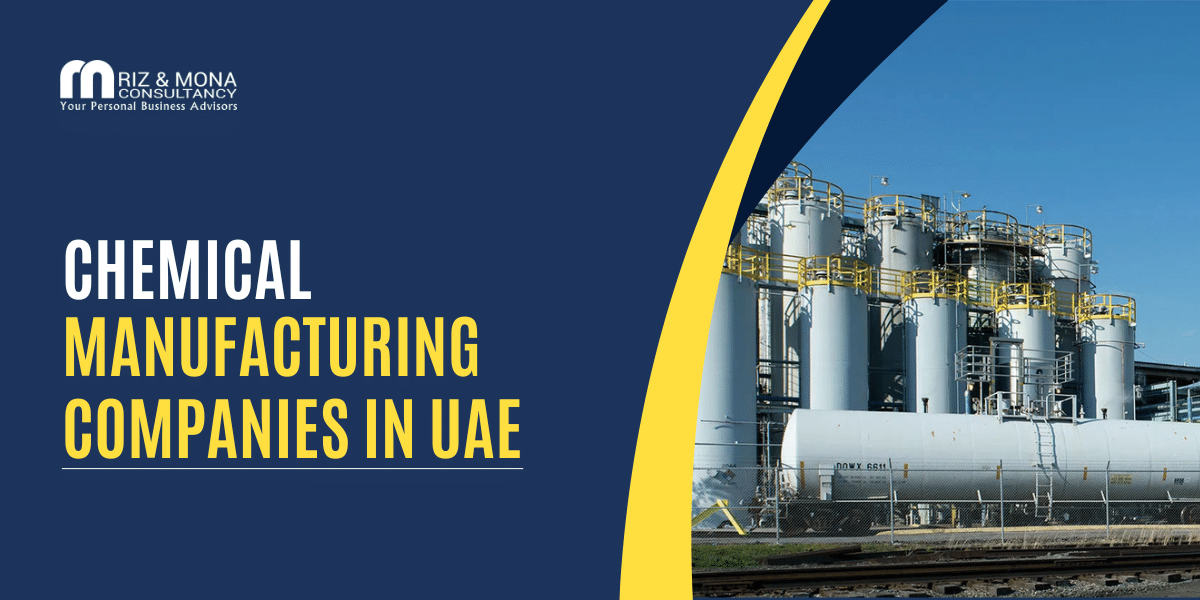Starting a Chemical Manufacturing Business in the UAE
Choose the Business Structure
Determine the type of business entity that best suits your goals. Common options for chemical manufacturing businesses include:
-
Limited Liability Company (LLC): Suitable for businesses with a local partner and permits full access to the UAE market.
-
Free Zone Company: Ideal for those who want 100% foreign ownership, tax exemptions, and easier import/export processes.
-
Branch of a Foreign Company: Allows a foreign company to operate directly in the UAE without forming a separate entity.
Obtain Business Licensing
You’ll need to apply for a manufacturing license from the Department of Economic Development (DED) or the relevant free zone authority, depending on your business structure and location.
-
Manufacturing License: Authorizes the production of chemicals.
-
Activity Approvals: For specific chemical manufacturing, such as handling hazardous materials, approvals from the UAE Environmental Agency or local municipality may be required.
-
Industrial License: A must for businesses involved in industrial operations, including chemical production.
Apply for Environmental and Safety Approvals
Chemical manufacturing involves handling potentially hazardous substances, so environmental and safety regulations must be adhered to:
-
-
Environmental Impact Assessment (EIA): Required to assess the potential environmental impact of the facility, especially if dealing with chemicals that could pose risks to the environment.
-
Civil Defence Approval: For handling hazardous materials and ensuring the safety of the facility, approval from local civil defence is essential.
-
Health and Safety Compliance: Ensure that your company meets the occupational health and safety standards required by the UAE government, including fire safety and chemical storage regulations.
-
Register with the Relevant Authorities
Once the license is obtained, the business must be registered with the appropriate trade registry and other regulatory bodies in the UAE:
-
Emirates Authority for Standardization and Metrology (ESMA): For businesses manufacturing chemicals that require national standards certification.
-
Municipality Approval: Depending on the emirate in which you operate, local municipalities may require inspections and approvals related to factory operations.
Secure Industrial Land and Facility Setup
Identify a suitable location for your manufacturing facility. Consider the following:
-
Free Zones: If choosing a free zone company structure, select a free zone that specializes in industrial or manufacturing businesses, such as the Jebel Ali Free Zone (JAFZA) or Ras Al Khaimah Free Trade Zone (RAK FTZ).
-
Infrastructure and Logistics: Ensure the location provides easy access to transportation routes and proximity to key suppliers and distributors.
Hiring and Labor Approvals
You’ll need to recruit skilled personnel, particularly in areas like chemical engineering, production, and quality control. Labor approvals and work permits from the Ministry of Human Resources and Emiratisation (MOHRE) will be required for hiring foreign workers.
Import and Export Permits for Chemicals
Depending on your chemical manufacturing processes, you may need to apply for import permits to bring raw materials into the UAE and export permits for finished products. These permits can be obtained through customs or relevant free zone authorities.
Comply with International Standards
To ensure your products meet both local and international standards, certifications like ISO 9001 (quality management) and ISO 14001 (environmental management) may be necessary. These certifications will help establish credibility and facilitate international trade.
Start Your Business Journey with Our Professional Support!
Top 20 Chemical Manufacturing Companies in the UAE
The UAE is home to several key chemical manufacturing companies, each playing a crucial role in both local and international markets. These chemical manufacturing companies in UAE produce a wide range of products, from basic industrial chemicals to specialized chemicals for various sectors like construction, water treatment, and oilfield services. Below are 20 of the most prominent companies in the UAE’s chemical manufacturing industry:
Market Trends and Growth Opportunities in the UAE Chemical Manufacturing Sector
1. Sustainability and Green Chemistry
The demand for sustainable and eco-friendly chemicals is growing rapidly in the UAE. Companies are increasingly focusing on green chemistry—chemicals that are produced through more sustainable processes that minimize environmental impact. This shift is driven by both consumer demand for environmentally responsible products and the UAE government’s commitment to reducing carbon emissions and enhancing sustainability.
Opportunities: Entrepreneurs can capitalize on the growing market for eco-friendly cleaning products, water treatment chemicals, and biodegradable plastics.
2. Advanced Technologies and Automation
With the UAE’s push for Industry 4.0, the chemical industry is embracing automation, artificial intelligence (AI), and IoT to improve operational efficiency and product quality. These technologies are enabling manufacturers to optimize their production processes, reduce costs, and maintain high standards of quality control.
Opportunities: Startups can explore solutions in automation systems, AI-driven chemical production, and smart manufacturing technologies that enhance product consistency and minimize waste.
3. Rise of Specialty Chemicals
The demand for specialty chemicals—high-value, niche chemicals tailored for specific applications—is rising in the UAE. Industries such as electronics, pharmaceuticals, and cosmetics are driving this demand. The need for tailor-made solutions in sectors like construction, automotive, and food processing also provides room for innovation.
Opportunities: There is significant room for growth in producing high-performance coatings, adhesives, pharmaceutical-grade chemicals, and custom-made chemical formulations.
4. Growing Role of Water Treatment Chemicals
As water scarcity remains a critical issue in the UAE, there is an increasing need for water treatment chemicals that ensure the availability of clean water for industrial and domestic use. Companies specializing in desalination chemicals, coagulation agents, and disinfection solutions are seeing substantial growth.
Opportunities: With the UAE’s expanding infrastructure, businesses that provide innovative water treatment solutions will have a competitive edge in the market.
5. Focus on Oilfield Chemicals
As the UAE continues to be a global hub for the oil and gas industry, oilfield chemicals—used in drilling, production, and refining—remain a cornerstone of the UAE’s chemical manufacturing sector. The sector is also seeing the rise of green oilfield chemicals that focus on environmental safety.
Opportunities: New chemical formulations for enhanced oil recovery (EOR), fracking fluids, and oilfield corrosion inhibitors present growing business prospects.
6. The Move Toward Local Production and Supply Chains
The UAE’s strategic focus on food security and local manufacturing has led to an increase in demand for locally produced chemicals used in agriculture, food processing, and construction. Local production reduces dependency on imports and enhances the resilience of the supply chain.
Opportunities: There is a growing market for locally sourced chemicals that meet international standards in sectors like agriculture, food safety, and construction.
Landscape of the Chemical Industry in Dubai, UAE
Petrochemicals: The UAE is home to significant petrochemical plants that process oil and natural gas into essential raw materials for plastics, chemicals, and other industrial products. Companies like Borouge and SABIC lead the charge in petrochemical production.
Water Treatment Chemicals: As the UAE faces challenges with water scarcity, water treatment chemicals play a vital role in ensuring the availability of clean water for industrial, municipal, and agricultural purposes. Companies are increasingly focusing on eco-friendly solutions.
Construction Chemicals: With the boom in infrastructure development, construction chemicals such as adhesives, sealants, and cement additives are in high demand. These chemicals are essential for modern construction and sustainability efforts across the UAE.
Specialty Chemicals: This sector covers a wide range of products used in advanced manufacturing, pharmaceuticals, electronics, and cosmetics, providing highly specialized solutions that cater to niche markets.
The UAE has a well-established regulatory framework that governs the chemical industry, ensuring safety, environmental protection, and quality control. The following key regulations and authorities oversee the industry:
UAE Federal Law on Environmental Protection: The UAE government enforces strict laws related to the environmental impact of chemical manufacturing, particularly regarding emissions, waste disposal, and sustainability efforts.
UAE Chemical Control and Safety Regulations: These regulations ensure that all chemicals manufactured and imported into the UAE comply with international standards for safety and handling. The Emirates Authority for Standardization and Metrology (ESMA) plays a pivotal role in regulating chemicals and ensuring quality control.
-
Dubai Central Laboratory (DCL): For chemicals used in the construction and water treatment sectors, the DCL ensures the compliance of all imported and locally manufactured products, establishing benchmarks for quality and safety.
-
Hazardous Materials Management: The UAE’s Civil Defence department regulates hazardous materials handling and storage, ensuring that companies adhere to safety protocols for chemicals that pose potential risks to the environment and human health.
-
Global and Local Certifications: To facilitate international trade and meet global standards, many UAE chemical manufacturers seek certifications such as ISO 9001 (quality management), ISO 14001 (environmental management), and OHSAS 18001 (occupational health and safety).
Challenges in the UAE Chemical Manufacturing Sector
Despite its growth, the UAE chemical manufacturing industry faces several challenges that companies must address to remain competitive and efficient.
| Business Idea | Description | Key Requirements | Market Opportunities |
|---|---|---|---|
| Handmade Soap and Natural Skincare Products | Chemical-free personal care products; local production; Dubai Municipality registration needed. | Cold-process soap making equipment, safety testing. | E-commerce, boutique stores, hotel suppliers. |
| Spice Grinding and Packaging | Cleaning, grinding, blending, and packaging of raw spices. | Stainless steel grinders, blending machine, food-grade packaging. | South Asian households, restaurants, grocery chains. |
| Eco-Friendly Bags and Reusable Packaging | Production of jute, canvas, recycled cotton bags amid plastic ban. | Cutting machine, stitching units, printing tools. | Supermarkets, retail chains, event organizers. |
| Scented Candles and Home Fragrance Products | Production of candles and fragrances for décor and gifting. | Wax melters, molds, fragrances, packaging supplies. | Craft fairs, e-commerce, hotel suppliers. |
| Custom T-Shirt and Apparel Printing | On-demand printing for uniforms, events, branding. | Heat press, vinyl cutter, screen printing gear. | Schools, gyms, corporate clients. |
| Paper Cups and Disposable Food Containers | Production of hygienic, eco-friendly disposable food containers. | Paper cup forming machine, small workspace. | Food delivery, takeaway services. |
| 3D Printing Services for Prototyping and Parts | Custom prototyping, architectural models, niche products. | 3D printers, modeling software. | Construction, healthcare, design sectors. |
| Healthy Snacks and Baked Goods Production | Organic snacks, sugar-free treats, gluten-free baked goods. | Licensed kitchen, food-grade facility. | Gyms, cafés, specialty grocers. |
| Perfume Blending and Bottling | Blending and packaging custom perfumes or ouds. | Blending oils, bottles, labeling; product registration. | Perfume trade, Gulf culture market. |
| Customized Corporate Gift Production | Local production of branded corporate gifts. | Laser engraving machine, sublimation printer. | Events, corporate sector, branded giveaways. |
FAQS (Frequently Asked Questions)
What are chemical production companies in the UAE?
Chemical production companies in the UAE focus specifically on the manufacturing of chemicals through processes that convert raw materials into chemical products. These companies play a vital role in meeting domestic demand and international exports.
What types of construction chemicals are produced in the UAE?
The UAE produces a wide range of construction chemicals, including adhesives, sealants, concrete additives, and waterproofing agents, which are essential for modern infrastructure projects and sustainable construction practices.
What is the role of the chemical distributor in the UAE chemical industry?
Chemical distributors in the UAE play a crucial role in connecting chemical manufacturers with end-users. They ensure efficient supply chain management, provide necessary storage solutions, and deliver products to industries like construction, agriculture, and oilfield services.
What are the advantages of working with chemical suppliers in the UAE?
Working with local chemical suppliers in the UAE offers benefits such as faster delivery times, reliable sourcing of raw materials, and access to region-specific products that meet local regulatory requirements.
How does the UAE ensure the quality control of imported chemicals?
The UAE enforces strict quality control measures for imported chemicals through agencies like the Dubai Central Laboratory and ESMA, ensuring that all chemicals meet international safety standards before entering the market.
How does the chemical manufacturing industry in the UAE contribute to global trade?
The chemical manufacturing industry in the UAE contributes to global trade by producing high-quality chemical products for various sectors such as construction, oil and gas, and water treatment, leveraging the UAE’s strategic location and infrastructure for efficient exports.















